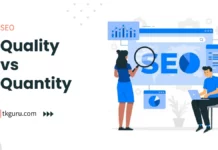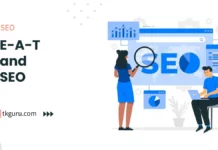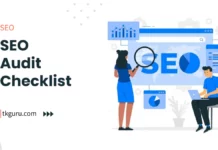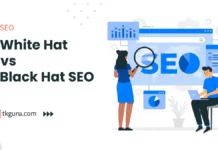Advertisements
Ratings
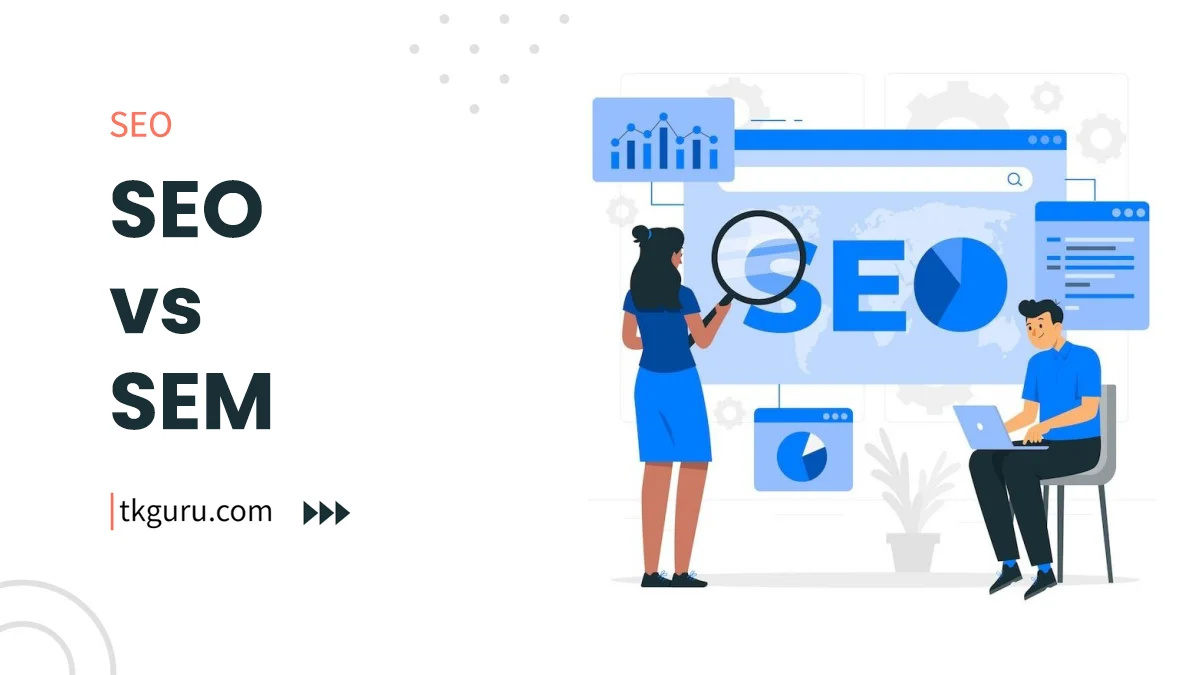
SEO vs SEM – In the dynamic realm of digital marketing, the terms “SEO” and “SEM” are ubiquitous, often used interchangeably. However, these two acronyms represent distinct strategies with unique characteristics and purposes.
In this comprehensive guide, we delve into the world of SEO (Search Engine Optimization) and SEM (Search Engine Marketing) to uncover their differences, benefits, and how businesses can leverage each approach to enhance their online visibility and reach.
Contents
1. Understanding SEO and SEM
1.1 SEO (Search Engine Optimization)
Table 1: SEO at a Glance:
| Aspect | Definition and Purpose |
|---|---|
| Definition | The process of optimizing a website to rank higher in organic search engine results. |
| Objective | Increase visibility and organic (non-paid) traffic to the website. |
| Key Techniques | On-page optimization, content creation, backlink building, technical enhancements. |
| Cost Structure | Investment in content creation, optimization, and technical improvements. |
| Timeframe for Results | Results often take time to materialize due to search engine indexing and ranking processes. |
SEO involves tailoring your website’s content, structure, and various technical elements to align with search engine algorithms. The primary goal is to improve organic rankings and generate free, high-quality traffic from search engine results pages (SERPs).
1.2 SEM (Search Engine Marketing)
Table 2: SEM at a Glance:
| Aspect | Definition and Purpose |
|---|---|
| Definition | The practice of using paid advertising to promote websites and increase their visibility on SERPs. |
| Objective | Generate paid traffic and increase immediate online visibility. |
| Key Techniques | Pay-per-click (PPC) advertising, keyword bidding, ad copywriting. |
| Cost Structure | Payment for clicks (PPC) or impressions on ads. |
| Timeframe for Results | Immediate visibility and traffic once ads are approved and campaigns are launched. |
SEM, on the other hand, encompasses a broader spectrum by utilizing paid advertising to secure immediate visibility on search engines. The most common form of SEM is pay-per-click (PPC) advertising, where businesses bid on keywords and pay when users click on their ads.
2. Differences Between SEO and SEM
2.1 Nature of Traffic
One of the fundamental differences between SEO and SEM lies in the nature of traffic they generate. SEO focuses on organic traffic, which is driven by search engine rankings.
When a user searches for a keyword relevant to your business, and your website appears in the organic search results, you attract visitors who are genuinely interested in your offerings.
On the other hand, SEM generates paid traffic through advertisements that appear at the top of search engine results.
These ads are labeled as “Ad” and provide immediate visibility to users who may or may not be actively seeking your products or services.
Table 3: Nature of Traffic Comparison:
| Aspect | SEO | SEM |
|---|---|---|
| Traffic Type | Organic (non-paid) | Paid |
| User Intent | Users actively searching for relevant information. | Users exposed to ads, some may not have immediate intent. |
| Visibility | Gradual buildup of organic rankings. | Immediate visibility upon ad approval and campaign launch. |
2.2 Cost Structure
The cost structure is another pivotal distinction between SEO and SEM. In SEO, businesses invest in strategies such as content creation, optimization, and technical enhancements.
While these investments do require resources, they contribute to the long-term organic visibility of the website.
In contrast, SEM operates on a pay-per-click (PPC) model. Businesses bid on keywords, and each time a user clicks on their ad, they incur a cost.
This model allows businesses to have direct control over their budget and expenditure, as costs are tied to actual user interactions.
Table 4: Cost Structure Comparison:
| Aspect | SEO | SEM |
|---|---|---|
| Cost Structure | Investment in content creation, optimization, and technical improvements. | Payment for each click or impression on ads. |
| Budget Control | Ongoing investment with long-term benefits. | Direct control over daily or campaign budgets. |
2.3 Timeframe for Results
The timeframe for experiencing tangible results differs significantly between SEO and SEM. In the realm of SEO, results often take time to materialize due to the intricate process of search engine indexing and ranking.
Building a reputable online presence, creating high-quality content, and earning valuable backlinks are gradual endeavors that contribute to long-term organic success.
In contrast, SEM provides a swifter path to visibility. Once an SEM campaign is set up and ads are approved, they can start appearing on search engine results pages almost immediately.
This rapid visibility is especially advantageous for businesses looking for quick exposure or seeking to capitalize on time-sensitive promotions.
Table 5: Timeframe for Results Comparison:
| Aspect | SEO | SEM |
|---|---|---|
| Timeframe | Gradual buildup of organic rankings, results over months. | Immediate visibility upon ad approval and campaign launch. |
3. Benefits of SEO
3.1 Organic Credibility
Organic search results are often perceived as more credible and trustworthy by users.
When a website ranks highly in organic search results, it signals to users that the website is authoritative and relevant to their query. This credibility can lead to higher click-through rates and increased user engagement.
3.2 Long-Term ROI
Investments in SEO can yield significant returns over time. While it may take time to see the full impact of SEO efforts, the benefits are long-lasting.
As your website gains higher organic rankings, it becomes a consistent source of free, organic traffic, reducing the need for ongoing advertising expenses.
3.3 Sustainability
The sustainability of SEO efforts is a distinct advantage. Building high-quality content, earning authoritative backlinks, and optimizing your website’s technical aspects contribute to sustained visibility.
Over time, as your website’s authority grows, it becomes more resilient to algorithm changes and remains competitive in search rankings.
Table 6: Benefits of SEO Comparison:
| Benefit | SEO | SEM |
|---|---|---|
| Organic Credibility | Signals authority and relevance, leading to higher user trust. | Immediate visibility, but may not carry the same level of credibility as organic results. |
| Long-Term ROI | Initial investment pays off over time with consistent organic traffic. | Immediate traffic but requires continuous investment for visibility. |
| Sustainability | Sustained visibility over time due to content, backlinks, and technical optimization. | Immediate visibility but dependent on ongoing ad budget. |
4. Benefits of SEM
4.1 Immediate Visibility
One of the most prominent benefits of SEM is its ability to provide immediate visibility. As soon as an SEM campaign is launched and ads are approved, they start appearing on search engine results pages.
This quick visibility is particularly valuable for businesses looking to gain exposure rapidly.
4.2 Precise Audience Targeting
SEM platforms offer robust targeting options that allow businesses to reach specific audiences based on demographics, locations, interests, and more.
This precision targeting ensures that your ads are shown to users who are most likely to be interested in your offerings, resulting in higher conversion rates.
4.3 Flexibility and Control
SEM campaigns offer businesses flexibility and control over their advertising efforts. Advertisers can set daily or campaign budgets, adjust bid strategies, target specific keywords, and even control the timing and frequency of their ads.
This level of control allows businesses to optimize their campaigns based on real-time performance data.
Table 7: Benefits of SEM Comparison:
| Benefit | SEO | SEM |
|---|---|---|
| Immediate Visibility | Gradual buildup of organic rankings. | Immediate visibility upon ad approval and campaign launch. |
| Precise Audience Targeting | Target a broad range of users based on keywords. | Target specific audiences based on demographics, locations, interests, etc. |
| Flexibility and Control | Limited control over organic rankings. | Direct control over budget, bid strategies, and targeting parameters. |
5. Choosing Between SEO and SEM
5.1 Considerations for Choosing SEO
The decision between SEO and SEM depends on various factors, including your business goals, budget, and timeline. Businesses should prioritize SEO when aiming for long-term organic credibility, sustainable visibility, and high ROI over an extended period.
However, it’s essential to understand that SEO requires patience, as results may take months to materialize fully.
5.2 Considerations for Choosing SEM
SEM is an ideal choice for businesses seeking immediate visibility and rapid results. If your business has a limited timeframe, such as promoting a time-sensitive offer or event, SEM can provide the exposure you need.
SEM is also valuable for businesses with flexible budgets, as you can control your spending based on real-time performance.
6. Combining SEO and SEM
While SEO and SEM have their unique strengths, a comprehensive approach involves combining both strategies.
By strategically integrating organic and paid efforts, businesses can create a well-rounded search engine presence.
SEM can provide immediate visibility while SEO builds a strong foundation for sustainable, long-term growth.
Table 8: Combining SEO and SEM:
| Aspect | SEO | SEM |
|---|---|---|
| Immediate Impact | Gradual buildup of organic rankings. | Immediate visibility upon ad approval and campaign launch. |
| Long-Term Growth | Sustainable visibility over time. | Immediate traffic but requires continuous investment for visibility. |
Conclusion
In the ever-evolving landscape of digital marketing, the choice between SEO and SEM should be a strategic decision based on your business’s goals, timeline, and resources.
SEO offers long-term credibility and sustainability, while SEM provides immediate visibility and precise audience targeting.
By understanding the differences and benefits of both strategies, businesses can craft a holistic approach to search engine visibility that aligns with their unique needs.
SEO vs SEM FAQs
What is the difference between SEO and SEM?
SEO (Search Engine Optimization) and SEM (Search Engine Marketing) are both strategies to increase a website's visibility on search engines, but they involve different approaches:
- SEO focuses on optimizing your website and content to rank organically in search results.
- SEM involves paid advertising to display your website prominently in search results through methods like pay-per-click (PPC) advertising.
Which one is better, SEO or SEM?
The choice between SEO and SEM depends on your goals, budget, and timeline.
SEO provides long-term benefits and can be cost-effective over time, while SEM offers immediate visibility but requires ongoing investment.
Does SEO impact organic search results, while SEM affects paid results?
Yes, that's correct. SEO aims to improve your website's visibility in organic (non-paid) search results.
SEM involves paid advertising, so its impact is seen in the paid search results section.
Is SEO more sustainable than SEM in the long run?
Yes, SEO can provide sustainable results over time. Once you achieve higher organic rankings, you can continue to receive traffic without ongoing advertising costs.
SEM requires a continuous budget for ads to maintain visibility.
Can SEO and SEM strategies be used together?
Absolutely. Many businesses use a combination of SEO and SEM to maximize their online presence.
While SEO builds a strong organic foundation, SEM can provide immediate visibility and complement your overall digital marketing strategy.
In summary, both SEO and SEM have their merits and can be used together to create a comprehensive search engine marketing strategy that aligns with your business goals and budget.
| Web Hosting | Website |
| WordPress | Google Adsense |
| SEO | Affiliate Marketing |
| Blogging | YouTube |
Recent Posts
- Top 6 SEO Companies in Ahmedabad 2024: Unlock Success with the Top SEO Companies in Ahmedabad
- Top 5 SEO Companies in Kanpur 2024: Discover the Top-Rated SEO Companies in Kanpur
- Quality vs Quantity: The Importance of High-Quality Backlinks
- E-A-T and SEO: Expertise, Authoritativeness, Trustworthiness
Related Tags
seo vs sem: which is better, difference between seo and sem pdf, difference between seo and sem with examples, seo vs sem vs ppc, difference between seo and sem in digital marketing, difference between seo and sem in tabular form, seo and sem examples, seo and sem full form



